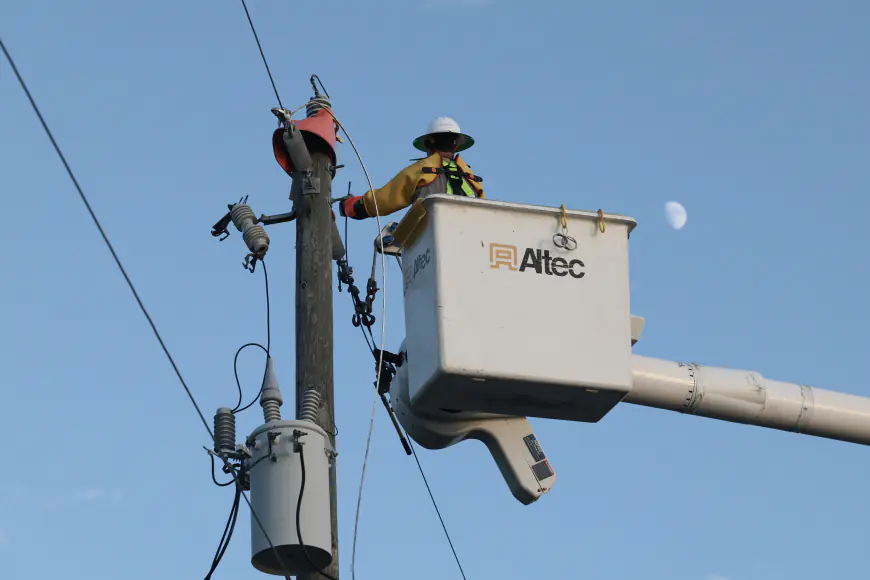FPL customers to pay about $12 more a month in 2025 to cover hurricane restoration costs
Customers of Florida’s largest power company will see a bump of about $12 in monthly bills next year to cover restoration costs from the 2024 hurricane season. The state Public Service Commission on Tuesday unanimously approved a $1.2 billion interim recovery package for Juno Beach-based Florida Power & Light, aimed at covering power restoration costs for Hurricanes Debby, Helene and Milton. The money also will help replenish a $150 million storm reserve fund. Jordan Luebkemann, an attorney who represents Florida Rising and the League of United Latin American Citizens, told the commission during Tuesday’s meeting that the power company’s recovery package will cause residential customers’ costs to increase “while large commercial and industrial customers got a break.” “Utilities which have participated in the carbon emissions that drive these stronger storms should have more skin in the game in terms of the cost recovery following those storms,” Luebkemann added. But Joel Baker, an attorney representing Florida Power & Light, told the panel that the storm-cost recovery process has been used on “multiple prior occasions.” The Miami Beach City Commission was among those that questioned the recovery plan. The commission last month approved a resolution, signed by Miami Beach Mayor Steven Meiner, that urged state utility regulators “to explore alternative approaches for addressing storm restoration costs and reserve replenishment that do not place an additional burden on FPL’s customers.” FPL wants to recover the costs from customers over a 12-month period starting in January. The commission in the past has regularly approved such costs, which are essentially a temporary add-on to customer bills. Utilities typically use as a benchmark residential customers who consume 1,000 kilowatt hours of electricity a month — though actual electricity use varies widely. FPL also has differing rates based on whether customers are in the utility’s traditional service area or a Northwest Florida area that was part of a purchase of the former Gulf Power. Under FPL’s proposal approved Tuesday, customers in the traditional service area who use 1,000 kilowatt hours of electricity would see their monthly bills go from the current $121.19 a month to $133.99 in January. Customers in the Northwest Florida area would see their bills go from the current $135.38 to $143.45, according to the utility. Much of the costs — about $811.1 million — stemmed from restoring power after Hurricane Milton, which made landfall Oct. 9 as a Category 3 storm in Sarasota County before crossing the state. FPL put its costs for Hurricane Debby, a Category 1 storm that hit the Big Bend region in early August, at $113.5 million. Hurricane Helene, a Category 3 storm that ran up the west coast before landfall Sept. 26 in Taylor County, came in at $157.8 million. The approved package is deemed “interim,” as the commission noted in a release that the charges are subject to a refund, with interest, pending further review once the total actual recovery costs are known. Duke Energy Florida and Tampa Electric Co. also have indicated they intend to seek recovery costs for the storm season. Duke has signaled it will seek $1.1 billion to $1.3 billion for hurricane-related costs. Tampa Electric Co. is seeking to recover $365 million to $425 million for costs related to Hurricanes Helene and Milton.

Customers of Florida’s largest power company will see a bump of about $12 in monthly bills next year to cover restoration costs from the 2024 hurricane season.
The state Public Service Commission on Tuesday unanimously approved a $1.2 billion interim recovery package for Juno Beach-based Florida Power & Light, aimed at covering power restoration costs for Hurricanes Debby, Helene and Milton. The money also will help replenish a $150 million storm reserve fund.
Jordan Luebkemann, an attorney who represents Florida Rising and the League of United Latin American Citizens, told the commission during Tuesday’s meeting that the power company’s recovery package will cause residential customers’ costs to increase “while large commercial and industrial customers got a break.”
“Utilities which have participated in the carbon emissions that drive these stronger storms should have more skin in the game in terms of the cost recovery following those storms,” Luebkemann added.
But Joel Baker, an attorney representing Florida Power & Light, told the panel that the storm-cost recovery process has been used on “multiple prior occasions.”
The Miami Beach City Commission was among those that questioned the recovery plan. The commission last month approved a resolution, signed by Miami Beach Mayor Steven Meiner, that urged state utility regulators “to explore alternative approaches for addressing storm restoration costs and reserve replenishment that do not place an additional burden on FPL’s customers.”
FPL wants to recover the costs from customers over a 12-month period starting in January.
The commission in the past has regularly approved such costs, which are essentially a temporary add-on to customer bills.
Utilities typically use as a benchmark residential customers who consume 1,000 kilowatt hours of electricity a month — though actual electricity use varies widely. FPL also has differing rates based on whether customers are in the utility’s traditional service area or a Northwest Florida area that was part of a purchase of the former Gulf Power.
Under FPL’s proposal approved Tuesday, customers in the traditional service area who use 1,000 kilowatt hours of electricity would see their monthly bills go from the current $121.19 a month to $133.99 in January. Customers in the Northwest Florida area would see their bills go from the current $135.38 to $143.45, according to the utility.
Much of the costs — about $811.1 million — stemmed from restoring power after Hurricane Milton, which made landfall Oct. 9 as a Category 3 storm in Sarasota County before crossing the state.
FPL put its costs for Hurricane Debby, a Category 1 storm that hit the Big Bend region in early August, at $113.5 million. Hurricane Helene, a Category 3 storm that ran up the west coast before landfall Sept. 26 in Taylor County, came in at $157.8 million.
The approved package is deemed “interim,” as the commission noted in a release that the charges are subject to a refund, with interest, pending further review once the total actual recovery costs are known.
Duke Energy Florida and Tampa Electric Co. also have indicated they intend to seek recovery costs for the storm season.
Duke has signaled it will seek $1.1 billion to $1.3 billion for hurricane-related costs. Tampa Electric Co. is seeking to recover $365 million to $425 million for costs related to Hurricanes Helene and Milton.
What's Your Reaction?







































































































